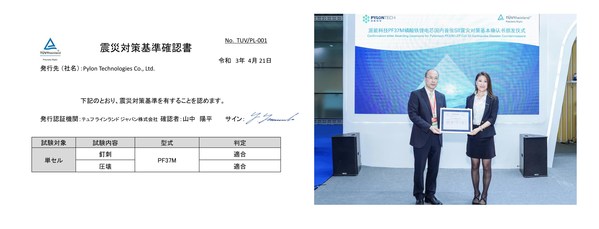With this document in hand, Pylontech becomes the first company in China to officially pass TUV Rheinland Japan's earthquake protection test for household energy storage systems.
Since 2011, the Japanese government has provided subsidies for lithium-battery energy storage systems installed in residences, businesses and institutions, with the aim of promoting the widespread use of household energy storage systems and rationalizing the use of electricity. The subsidy requirements specify that household energy storage systems and components should be designed to withstand earthquakes. Specifically, battery cells need to pass the puncture test as described in Article 4.3.3 and the extrusion test as described in Article 4.3.6 of the SAE J2464 NOV 2009 standard.
Pylontech repeatedly verified and evaluated its PF37M battery cell products in-house. After being sampled by TUV Rheinland engineers on the production line, the samples were sent to TUV Rheinland's Japanese laboratory for a series of rigorous tests and passed the tests in one go. This shows that the flexible-packaging LFP cell products developed and produced in-house by Pylontech boast reliable safety performance.
Pylontech has been expanding its presence in the Japanese market for a long time. The Confirmation of Earthquake Disaster Countermeasure Standard the cell received from TUV Rheinland Japan opens the door for Pylontech's entry into the vast Japanese energy storage market.
The PF37M battery cell has a rated capacity of 37Ah, and has received JIS, UL and IEC certifications, meeting the energy storage requirements for most of the scenarios that can be encountered whether within a residential, commercial or industrial environment, or for use by a communication base station or a power grid.

